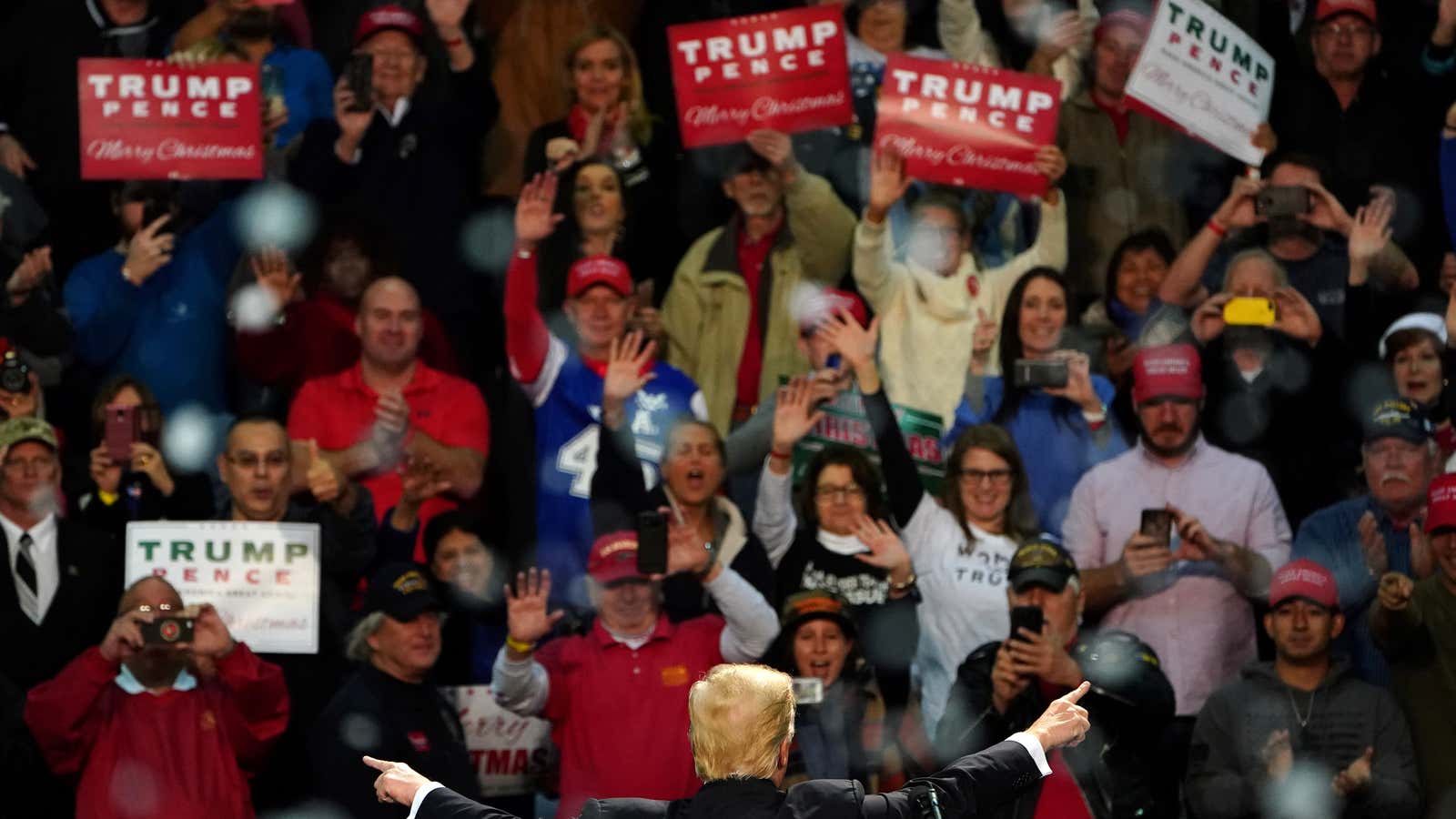In a year of hurricanes, wildfires, nuclear threat from North Korea, and a #MeToo movement that toppled powerful men, the markets remained eerily calm. The VIX—the market’s collective “fear gauge”—hit an all-time low, bottoming at 9.14 in November, dropping more than 17% over all of 2017.
If you had invested $1,000 in the the S&P 500 on the first day of this year and done nothing else, you would be $189 richer.
Historically, low volatility as measured by the VIX has preceded a market crash. The VIX hit what looked like a historic low in 1995, two years before the Asian Financial Crisis, and again in 2006, a year before the global financial meltdown. It’s rare for markets to stay quiet more than a couple years—once the tides turn, volatility returns within months.
So what’s going on? Ask around, and you’ll find many opinions: We’re on the brink of another crisis, we’ve arrived at a new stock market normal, or there’s nothing to see here, volatility is consistent with historical patterns.
What’s confusing is market volatility has remained low while political volatility has risen, a reversal of years past. The VIX shot when Iran invaded Kuwait (41%) in 1990, when Russia ousted Gorbachev (up 32%) in 1991, when the House rejected a $700 billion bank bailout (up 34%) in 2008, and after the Boston marathon bombing (up 43%) in 2013. It even spiked as the US military dropped the largest non-nuclear bomb in Afghanistan last April.
The tax plan trumps all
Rumors of finance-friendly policies are the fuel of markets, and 2017 was filled with them. Trump’s tax plan drove markets wild. As finally passed, it gives companies a roughly $2 trillion tax cut, close to 7% of the capitalized value of the full market. News of the tax plan turned the market into a see-saw—up when it seemed closer to passing, down when it didn’t.
Exuberance over the tax plan, and the Trump presidency at large (the “Trump rally”), overrode everything. Trump wants to cut government regulation by 75%, reverse environmental protections, and undo Obama-era drug policies.
The market surged further as the global economy broke out of a decade-long growth slump and company earnings whistled past expectations. Meanwhile, the hurricanes that battered the US coastline boosted the valuation of oil companies.
In the last six months, the president has tweeted about the market’s hefty returns a subtle 20 or so times.
The stock market isn’t the economy
So why are economists grumbling about the tax bill? A poll of 42 top economists from the University of Chicago—Nobel laureates and former White House advisers among them—found that just one thought the Republican tax plan would boost GDP. Most didn’t, with a small share who were uncertain.
The stock market, of course, isn’t the economy. A better judge of economic prosperity is GDP per capita, and that’s grown, in real terms, 12% since 2009. While jobs came back in 2017, wages remained sluggish. In almost half a century, average hourly earnings have barely budged while stock market returns have risen more than 300%.
A recent report from the Federal Reserve shows that 52% of American families in 2016 owned stocks, either directly or indirectly, up from 49% in 2013. Among the top earners, 94% owned stocks, and thus it’s the very richest who benefit the most from the rising market.
A Gallup poll shows that more Americans participated in the stock market before the financial crisis, with 62% owning stocks in 2008. Two ownership groups have persisted as big investors in the markets: those over 65 years old, and those with household wealth above $100,000.
People who traded based on currencies and macro trends this year fell behind. The fund of billionaire investor Stanley Druckenmiller, a macro trader, is up by single digits. ”You know, I’m having, again, relative to the opportunity, a terrible year. It’s going to be my first—barring a miracle—it’s going to be my first down year in currencies ever,” he told Kelly Evans in an interview with CNBC.
Druckenmiller admits that if he’d invested in bitcoin—which soared more than 1300% this year—his portfolio would look different. “I don’t own any,” he told Evans. “Obviously as a trader I should have, but I only trade what I know.”
